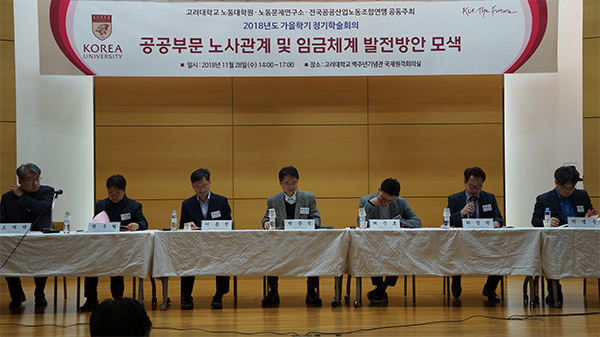
The Labor Today learned that the Ministry of Economy and Finance(MOEF) is planning to hold a public debate in relation to the reform of the wage system in the public institutions including the introduction of the job-based wage system next month. The labor circle in the public sector criticized that the government moves to reform the wage system without sufficient discussions.
According to the information provided by both the MOEF and the labor circle on November 28, the Korea Institute of Public Finance is organizing a public debate on December 10 under the sponsorship of the MOEF to discuss the reform of the compensation system in the public institutions. A pilot case study will be presented in the debate regarding the Saemangeum Development Corporation established last month for its application of the job-based wage system.
A related MOEF official said that "we are in the process of hearing the opinions of the labor circle and the experts and also conducts the pilot project. However, we have yet to come up with the finalized timeline and contents regarding the reform of the compensation system in the public institutions." The labor circle showed their distrust. A labor union officer of the 'Joint Countermeasures Committee of the Public Sector Labor Unions', formed by the labor unions of the Federation of Korean Trade Unions(FKTU) and Korean Confederation of Trade Unions(KCTU) in the public sector, said that "we have experienced several times already in the past that the government pushed ahead with their original plan, after just holding a few rounds of public debates. How can we build up a trust with the government in a situation that there is no official request asking labor unions to participate (in the process)?"
According to the minutes of the 14th Public Institution Steering Committee, the Labor Today learned that an agenda regarding the reform of the public institutions was reported to the committee held on September 28. Prof. Won sook-yeon of Ewha Womans University, an independent member of the committee, pointed out that "bearing in mind that we have experiences in the past that wage-related policies had caused various types of resistances, it is therefore necessary to proceed the policy with a relatively adequate breathing space and sufficient consultation. As far as the job-based wage system is concerned, we face a very difficult problem of how to make an analysis on the jobs which requires a lot of further studies and simulations."
Yang Choong-mo, the then public policy director general of the MOEF, replied that "we are in the process of consulting with the labor circle regarding the compensation system based on the outcome of a research study and a couple of public debates are also in the pipeline." MOEF 2nd Vice Minister Kim Yong-jin who was presiding over the committee also said that "we need a comprehensive support of the social opinion and the public, along with the dialogues with workers and the opinion collections, which are currently under way."
The labor circle narrates a different story. Another labor union official of the Joint Countermeasures Committee said flatly that "we have never been consulted with the MOEF regarding the reform of the wage system."
In a seminar jointly organized by the Federation of Korean Public Industry Trade Unions(FKPIU) and Korea University on November 28, Cho Yang-seok, FKPIU policy director, unveiled a survey result conducted targeting union members regarding the wage system that "79.6 percent of the respondents have already expressed their opposition against the introduction of the job-based wage system, even though the government plan has yet to be made public."
Prof. Chae Joon-ho of Chonbuk National University said that "the wage policy should not be pursued in an approach to cut the labor cost or to expand the performance-based compensation system." He made a proposal in the direction to reduce the wage gap between the public institutions and to resolve the wage discrimination between the forms of employment and the types of jobs, under the four principles of the reform of the wage system: the fixed life-time gross wage, Korean specifics into consideration, guaranteeing active participation of labor unions, and a long-term project.
Lee Jong-seon, deputy director of the Korea University Institute for Research on Labor and Employment said that "we do need sufficient discussions for an agreement and the public debate process, not a unilateral decision by the government. The answer should be sought after only through the social dialogue."
reported by Yoon Ja-eun
translated by Kim Sung-jin

